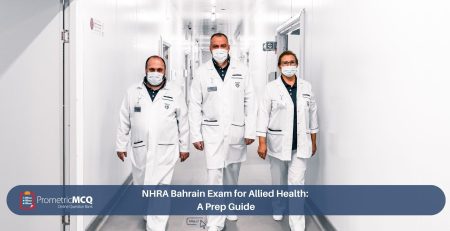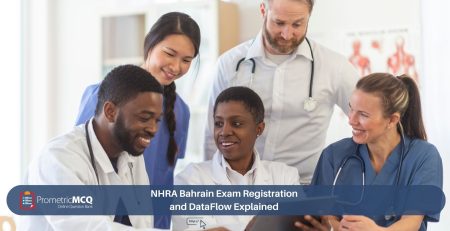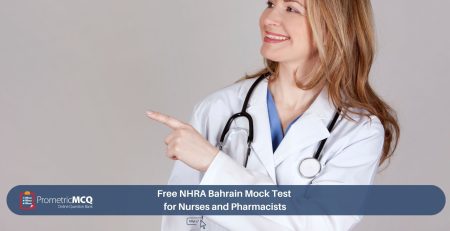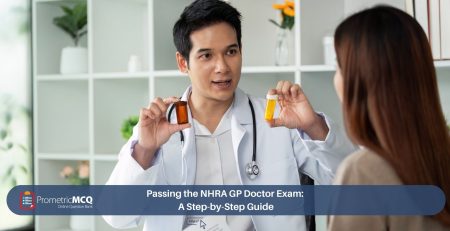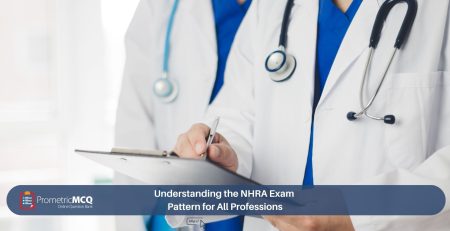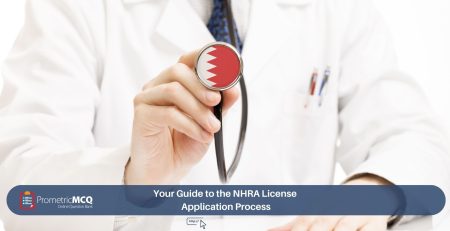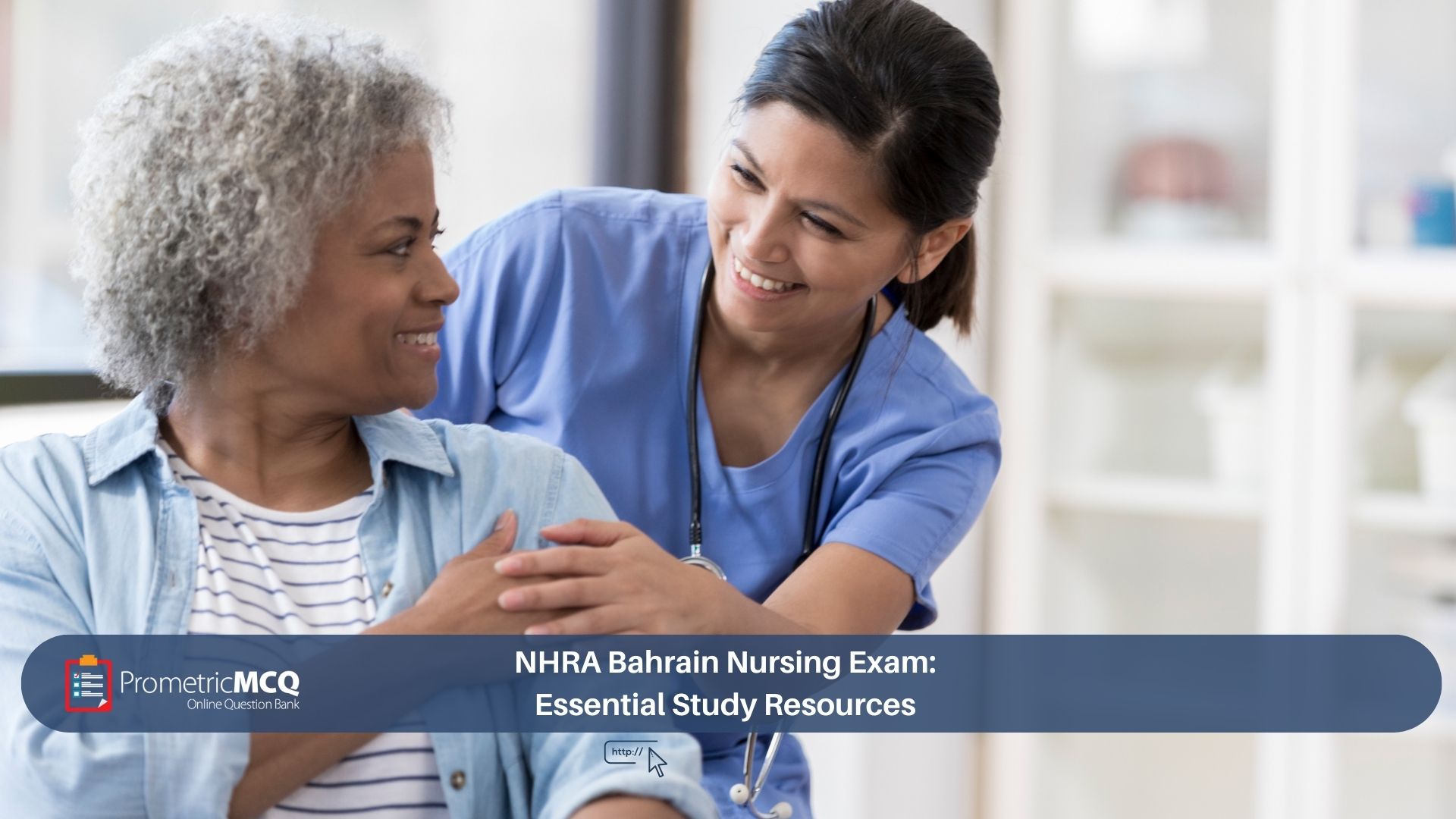
NHRA Bahrain Nursing Exam: Essential Study Resources
fatima@prometricmcq.com2025-09-19T01:35:32+00:00Table of Contents
ToggleNHRA Bahrain Nursing Exam: Essential Study Resources (2025)
For international nurses, securing a license to practice in the Kingdom of Bahrain is a gateway to a professionally rewarding career in a cutting-edge healthcare environment. The cornerstone of this journey is the National Health Regulatory Authority (NHRA) Nursing Licensure Exam. This comprehensive, computer-based test is meticulously designed to validate your clinical skills, critical thinking abilities, and commitment to international standards of patient safety. Simply put, success on this exam is non-negotiable.
However, the path to success is paved with a bewildering array of study materials, online courses, and preparation guides. Choosing the right resources is the single most important decision you will make in your study plan. An effective strategy isn’t about consuming the most information; it’s about engaging with the *best* information in the most efficient way. A focused approach using high-yield, exam-specific resources is what separates a “Pass” from a “Fail”.
This ultimate 2025 guide is engineered to be your definitive roadmap to the most essential study resources for the NHRA Nursing Exam. We will cut through the noise and provide a curated list of the best textbooks, question banks, and digital tools. We will not only tell you *what* to study but *how* to integrate these resources into a powerful, effective study plan. Complete with a comprehensive 10-point FAQ, this guide will provide the clarity and confidence you need to conquer the exam.
Key Takeaways on Essential Study Resources
- Question Banks (QBanks) Are Non-Negotiable: Active learning with high-quality MCQs is the single most effective preparation strategy.
- Build a Strong Foundation: Use a comprehensive NCLEX-RN review book (like Saunders) to cover the vast nursing syllabus efficiently.
- Focus on High-Yield Topics: Prioritize your study time on the most heavily tested areas: patient safety, prioritization, pharmacology, and infection control.
- Integrate, Don’t Just Accumulate: A successful plan uses a combination of resources—textbooks for knowledge, QBanks for application, and flashcards for memorization.
- Active Recall Over Passive Review: Consistently test yourself. The act of retrieving information from your brain is what builds strong, lasting memory.
Tier 1: Foundational Bedrock Resources
Before you can answer complex clinical scenarios, you must have a solid foundation of nursing knowledge. These resources are the bedrock of your preparation. They are not meant to be read cover-to-cover, but to be used as comprehensive references to build and clarify your understanding of core concepts.
1. A Comprehensive NCLEX-RN Review Book
Why it’s essential: The NHRA Nursing Exam, like other GCC licensing exams, is benchmarked against international standards, which are heavily influenced by the NCLEX-RN exam from the United States. Therefore, a good NCLEX review book is the most efficient way to cover the entire nursing curriculum.
- Top Recommendation: Saunders Comprehensive Review for the NCLEX-RN® Examination. This book is globally recognized as the gold standard. Its key strengths are its detailed content review, thousands of practice questions with rationales, and its strategic focus on test-taking strategies.
- How to Use It: Use the book’s content chapters to review systems and concepts (e.g., cardiovascular, respiratory, pharmacology). Pay special attention to the “Pyramid Points” or key takeaways in each chapter. Use the accompanying question bank to test your knowledge after reviewing each section.
2. A Core Medical-Surgical Nursing Textbook
Why it’s essential: Medical-Surgical nursing forms the largest part of the NHRA exam. While the Saunders book is excellent for review, a dedicated Med-Surg textbook provides the depth needed to understand complex disease processes.
- Top Recommendations: Brunner & Suddarth’s Textbook of Medical-Surgical Nursing or Lewis’s Medical-Surgical Nursing: Assessment and Management of Clinical Problems.
- How to Use It: Do not read it from start to finish. Use it as a reference. When you get a QBank question wrong about a specific condition (e.g., heart failure or COPD), turn to the relevant chapter in Lewis or Brunner’s to deepen your understanding of the pathophysiology, clinical manifestations, and nursing management.
Tier 2: The Ultimate Weapon for Active Learning
Passive reading can create an illusion of competence. True learning and exam readiness come from active recall and application. This is where a high-quality Question Bank (QBank) becomes the single most important resource in your arsenal. This is the core of effective Bahrain NHRA exam preparation.
The Question Bank (QBank)
Why it’s essential: A QBank is a dynamic learning tool that simulates the exam environment and trains your brain to handle MCQ-based clinical scenarios. It’s not just a test; it’s a learning system.
- What to Look For:
- Large Volume of Questions: Aim for a QBank with at least 2,000+ questions.
- Detailed Rationales: The explanation is more important than the question itself. A good rationale explains why the correct answer is right and, crucially, why the incorrect options (distractors) are wrong.
- Timed and Tutor Modes: Use tutor mode to learn and timed mode to simulate exam pressure.
- Performance Analytics: The ability to track your performance by subject area is vital for identifying your weaknesses.
- How to Use It:
- Start with small, untimed, topic-specific quizzes in “tutor mode.”
- Read every single rationale, even for questions you got right.
- As you progress, move to larger, mixed-subject quizzes under timed conditions.
- In the final weeks, take full-length (150-question) simulated exams to perfect your pacing and build endurance.
- Top Recommendation: A specialized platform like PrometricMCQ’s Nursing MCQs is tailored for Gulf licensing exams, ensuring the content and style align with what you’ll face on test day.
Tier 3: Supplementary and Specialized Resources
These resources are designed to target specific areas of knowledge and different learning styles, rounding out your preparation.
1. Pharmacology Flashcards
Why they’re essential: Pharmacology is a major component of the exam and relies heavily on memorization (drug classes, side effects, nursing considerations). Flashcards are the most effective tool for this type of active recall.
- How to Use Them: Create your own or use pre-made digital flashcards (e.g., via apps like Anki). On one side, put the generic drug name. On the other, list its class, mechanism of action, key side effects, and critical nursing considerations. Review them daily.
2. Authoritative International Guidelines
Why they’re essential: The NHRA exam is built on a foundation of international best practices for patient safety. Familiarizing yourself with these standards demonstrates a higher level of professional understanding.
- Top Recommendation: The Institute for Safe Medication Practices (ISMP) Guidelines. The ISMP is a globally recognized authority on preventing medication errors. Reviewing their “List of High-Alert Medications” and guidelines on error-prone abbreviations provides invaluable insight into the safety-focused mindset of the exam.
Frequently Asked Questions (FAQs) for the NHRA Nursing Exam
The ideal study period varies, but a structured plan over 8 to 12 weeks is recommended for most candidates. This allows enough time for a comprehensive content review followed by intensive MCQ practice without leading to burnout.
Be extremely wary of sources that offer “exam dumps” or promise to have the exact questions from the real exam. The NHRA exam question pool is vast and frequently updated. Using these materials can provide a false sense of security and often contain outdated or incorrect information. Stick to reputable resources that focus on teaching concepts.
The NHRA provides a simple “Pass” or “Fail” result. There is no official passing percentage released. However, the generally accepted standard is around 60%. Your goal should be to consistently score above 70-75% in your QBank’s simulated exams to ensure a comfortable margin of safety.
While your clinical experience is invaluable, it is not enough to pass the exam. The NHRA exam tests “textbook” nursing based on international best practices, which may differ from the specific protocols of your previous hospital. You must study the specific content and learn how to answer standardized test questions.
It is extremely important. Pharmacology questions, including dosage calculations, are integrated throughout the exam. You must be comfortable with major drug classes, their mechanisms, side effects, and all related nursing responsibilities. Dosage calculation questions require 100% accuracy.
Primary Source Verification (PSV) by the DataFlow Group is a mandatory process where your educational and professional credentials are verified directly from their original source. This must be completed successfully before the NHRA will issue your license to practice. It is a separate process from the exam itself.
Without a doubt, a high-quality question bank (QBank). If you can only choose one resource, make it a QBank. The active learning, detailed rationales, and exam simulation it provides offer the highest return on your study time investment compared to any other single resource.
Use your QBank’s performance analytics. After completing a few hundred questions, the analytics will clearly show you which subject areas (e.g., “Cardiovascular,” “Pharmacology,” “Infection Control”) are your weakest. This data-driven approach allows you to target your revision exactly where it’s needed most.
Yes. YouTube channels like “RegisteredNurseRN” offer excellent, clear video explanations of complex nursing topics. Additionally, many major nursing organizations and drug companies provide free, reliable information on their websites. However, for structured exam preparation, a dedicated QBank is essential.
The NHRA Nursing Exam is a Computer-Based Test (CBT) consisting of 150 MCQs to be completed in 3 hours. It is a broad exam covering all major areas of nursing. For a more detailed breakdown, you can refer to our guide on the NHRA Exam Pattern for All Professions.
Conclusion: Building Your Arsenal for Success
Passing the NHRA Nursing Exam is a systematic process, not a game of chance. It requires a strategic combination of foundational knowledge and active, application-based learning. By building your study plan around the essential resources outlined in this guide—a core review book, a powerful question bank, and supplementary tools like flashcards—you create a comprehensive and formidable preparation strategy. Focus your efforts, trust the process, and leverage these high-quality resources to transform your goal of practicing nursing in Bahrain into a well-deserved reality.
Ready to Put the Best Resources into Practice?
Our premium NHRA Nursing QBank is your complete study solution, featuring thousands of high-yield questions, detailed rationales from experts, and full-length simulated exams to build your confidence and guarantee your success on exam day.



